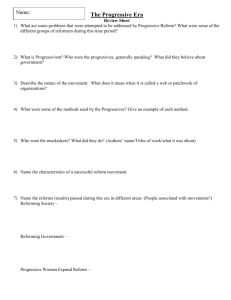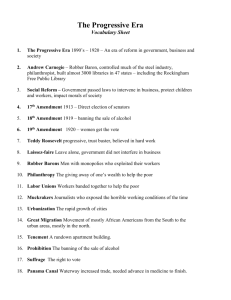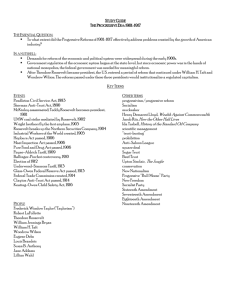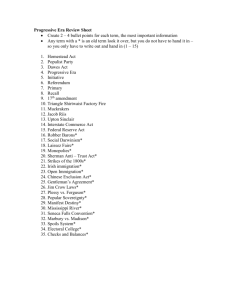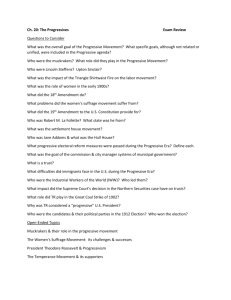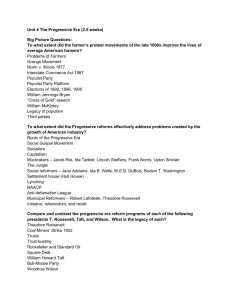File
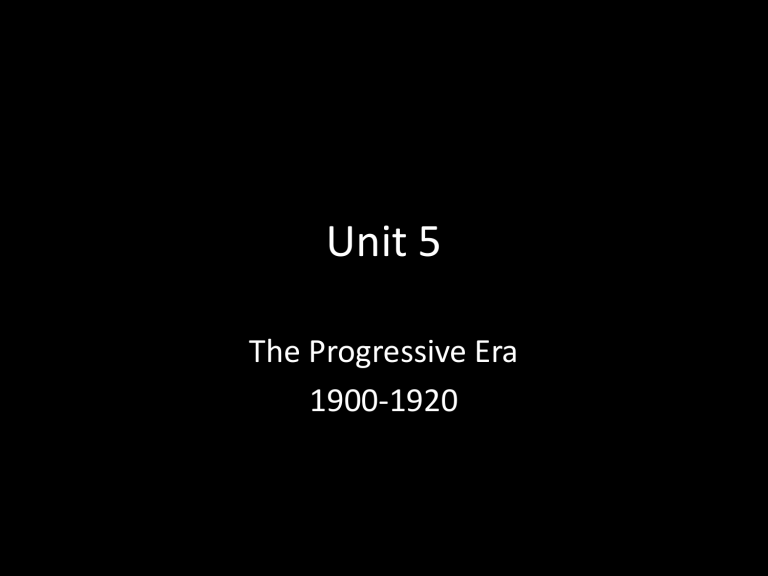
Unit 5
The Progressive Era
1900-1920
The Progressive Era
•
Progressive Era: Time period from 1900-1920 marked by reform to solve problems largely caused by industrialization
– Areas of focus:
• Labor rights
• Political reform
• Consumer protection
• Women’s rights
• Business regulation
• Moral reform
Progressive Era cont.
• Populist Party:
– A US political party that sought to represent the interests of farmers and laborers in the 1890s, advocating increased currency issue, free coinage of gold and silver, public ownership of railroads, and a graduated federal income tax.
– Roots of the progressive movement
• Progressive Party
– political party that carried on many populist ideas.
– Formed in 1912
– they sought to bring many social and political changes.
– Also called the Bull Moose Party.
Progressive Era cont.
•
Progressives were not radical
– They wanted capitalism and democracy preserved
– Progressives did call for an end to laissez-faire government in the U.S.
• They asked for, and got, a new role for our government
Muckrakers
•
Muckrakers were journalists who revealed corporate corruption and bring public attention to the problems caused by industrialization.
•
Muckrakers urged people to fight for reforms
Muckrakers cont.
• Ida Tarbell
– Wrote A History of Standard Oil
– she made the public aware of the practices of the Big business
• Upton Sinclair
– Author of The Jungle
– Meat packing industry
• The Jungle (1906)
– A book written by Upton Sinclair that exposed the horrendous and downright gross conditions of the foodpackaging industry of the time and inspired pro-consumer federal laws regulating meat, food, and drugs.
Political Reform
• Direct Democracy: A form of democracy where the people make decisions directly
• William U'ren
– State representative from Oregon who fought for the direct election of senators, initiatives, recalls, and referendums.
– His ideas became known as the Oregon plan and were copied by other states.
• Initiative
– Progressive proposal to allow voters to propose legislation themselves
• Referendum
– A form of direct democracy that places proposed laws on ballots, allowing the people to vote on them directly.
• Recall
– giving voters the ability to remove from office disloyal or incompetent officials
• 17th Amendment
– Progressive Era Amendment passed in 1913 that allowed for the direct election of senators instead of state legislatures selecting them.
Political reform cont.
• Robert M. La Follette
– A republican and later progressive politician
– He served as Governor, Senator and Representative for Wisconsin.
– He is the associated with the "Wisconsin Idea" for government.
– His reforms include the direct primary, worker's compensation and state regulation of railroads.
• Direct primary
– allowing voters to select a candidate for the general election for their party instead of holding a convention of party officials to select one.
Politics: Economy
• Underwood Tariff
– Pushed through Congress by Woodrow Wilson, this 1913 tariff reduced average tariff duties by almost 15% and established a graduated income tax.
– It was part of Wilson's progressive attacks on tariffs.
• Federal Reserve Act
– a 1913 law that set up a system of federal banks and gave government the power to control the money supply.
– It made modern monetary policy possible.
– By controlling the money supply, the government can limit inflation and unemployment.
• 16th Amendment
– passed in 1913 that provided for the federal income tax.
– It provided a source of government revenue other than tariffs.
Politics: Women’s Suffrage
• Suffrage
– The legal right to vote
• Alice Paul
– Women's rights activist and suffragist who formed the National
Women's Party to fight for suffrage.
• National American Women's Suffrage Association (NAWSA)
– Founded by Elizabeth Cady Stanton and Susan B. Anthony to gather support for an amendment guaranteeing women's suffrage.
– It was lead by Carrie Chapman Catt after 1910.
• 19th Amendment
– Progressive Era Amendment passed in 1920 that granted suffrage to
American Women.
– It was first called for in 1848 by the Seneca Falls convention.
Consumer Protection
• Meat Inspection Act (1906)
– An act passed which allowed the Federal Government to inspect and ensure the quality of meat products in the United States.
• Pure Food and Drug Inspection Act (1906)
– An act which called for the regulation of consumer products to prevent false advertising. It prohibited false statements on food labels.
• Both acts were passed in response to public pressure after the publication of The jungle
Moral Reform
•
Temperance
– A moral and reform movement that sought to end social problems by limiting the use of alcohol.
– Its ultimate victory was the 18th amendment.
•
18th Amendment
– passed in 1919 that outlawed the distribution and sale of alcohol.
– It marked the beginning of prohibition in America.
Business Regulation
• Trustbuster
– informal name given to T. Roosevelt and W. H. Taft for their devotion to dissolving corrupt, monopolistic trusts.
• Federal Trade Commission Act
– authorized a presidentially-appointed commission to oversee industries engaged in interstate commerce, such as the meatpackers.
– The commissioners were expected to crush monopolies at the source.
• Clayton Anti-Trust Act
– New antitrust legislation constructed to remedy deficiencies of the Sherman Antitrust Act, namely, it's effectiveness against labor unions
• Hepburn Act (1906)
– expanded the Interstate Commerce Commission to include in its powers the prosecution of express companies, sleeping-car companies, and pipelines.
– For the first time gave the ICC that ability to nullify existing rates and set maximum rates.
• Northern Securities Co. v. United States
– 1904 Supreme court case that was a victory against trusts.
– The supreme court ruled that the Northern Securities railroad trust had to break up.
– It was the first major victory for the Sherman Anti-Trust Act.
Labor Rights
• Workingmen's Compensation Act
– established an all-purpose protection program for Federal civilian employees and their dependents in the event of injury or death
• Anthracite coal strike
– marked a change in the way that Presidents dealt with business owners and labor.
– Teddy Roosevelt tried to have management and labor meet in
Washington, when management refused, he punished them by threatening to use the National Guard to take their mines away.
– This was the first pro-labor presidential response in a strike.
• Minimum Wage
• Child Labor Laws
Election of 1912
• Three way contest between Democrat Woodrow
Wilson, Republican William Howard Taft, and
Progressive Theodore Roosevelt.
• Roosevelt split off of the Republican party and stole many votes from Taft which allowed Wilson to win by a large margin in the electoral college.
• William Howard Taft
– President after Roosevelt;
– Different views than Teddy
– Still progressive
– Republican nominee in 1912
Election of 1912 cont.
• Theodore Roosevelt
– President of the United States from 1901-1909
– first real progressive president.
– He handled labor and big business differently than previous presidents.
– He also sought environmental conservation.
– Bull Moose Progressive candidate in 1912
• Square Deal
– the stated policy of President Theodore Roosevelt, originally promising fairness in all dealings with labor and management and later extended to include other groups.
• New Nationalism
– Theodore Roosevelt's political belief in a strong government to regulate industry, protect the middle and working classes, and carry on great national projects
– Campaign slogan for 1912
Election of 1912 cont.
• Woodrow Wilson
– Democratic candidate for president in 1912.
– He won the three-way election largely because of division within the Republican party.
– He was considered a progressive President.
– He was the first liberal Democratic president.
• New Freedom
– Woodrow Wilson's campaign slogan for his first term that focused on limited government.
– It also came to represent his progressive reforms during his first term that focused on tariffs, banks, and business reform.
